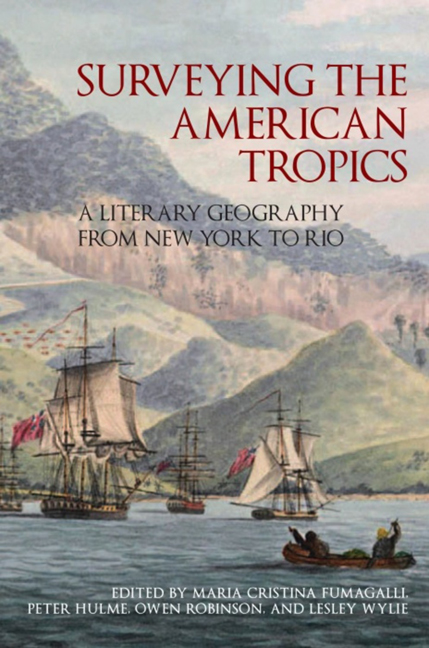Book contents
- Frontmatter
- Dedication
- Contents
- List of illustration
- Introduction
- A Tree Grows in Bajan Brooklyn: Writing Caribbean New York
- Reading the Novum World: The Literary Geography of Science Fiction in Junot Díaz's The Brief Wondrous Life of Oscar Wao
- Inventing Tropicality: Writing Fever, Writing Trauma in Leslie Marmon Silko's Almanac of the Dead and Gardens in the Dunes
- Imperial Archaeology: The American Isthmus as Contested Scientific Contact Zone
- Space Age Tropics
- Black Jacobins and New World Mediterraneans
- The Oloffson
- Dark Thresholds in Trinidad: Regarding the Colonial House
- Micronations of the Caribbean
- Golden Kings, Cocaine Lords, and the Madness of El Dorado: Guayana as Native and Colonial Imaginary
- Suriname Literary Geography: The Changing Same
- The Art of Observation: Race and Landscape in A Journey in Brazil
- Notes on Contributors and Editors
- Index
Black Jacobins and New World Mediterraneans
- Frontmatter
- Dedication
- Contents
- List of illustration
- Introduction
- A Tree Grows in Bajan Brooklyn: Writing Caribbean New York
- Reading the Novum World: The Literary Geography of Science Fiction in Junot Díaz's The Brief Wondrous Life of Oscar Wao
- Inventing Tropicality: Writing Fever, Writing Trauma in Leslie Marmon Silko's Almanac of the Dead and Gardens in the Dunes
- Imperial Archaeology: The American Isthmus as Contested Scientific Contact Zone
- Space Age Tropics
- Black Jacobins and New World Mediterraneans
- The Oloffson
- Dark Thresholds in Trinidad: Regarding the Colonial House
- Micronations of the Caribbean
- Golden Kings, Cocaine Lords, and the Madness of El Dorado: Guayana as Native and Colonial Imaginary
- Suriname Literary Geography: The Changing Same
- The Art of Observation: Race and Landscape in A Journey in Brazil
- Notes on Contributors and Editors
- Index
Summary
We all recognise the back-handed compliment of one of the most familiar formulas for comparison: so and so (fill in the name of a national patriot/founding father of another nation) is the George Washington of his country. Who can miss the assumption of superiority in the presumed equal sign? The equation puts the second term, the other, first but doesn't fool anyone in the process. No spectres shadow these comparisons, at least not with the subtle kind of haunting that Benedict Anderson finds in José Rizal's (first great novelist and founding father of the modern Philippine nation) famous Filipino nationalist novel Noli Me Tangere (1887), when the young mestizo hero views the botanical gardens in colonial Manila and sees the shadow of their European sister gardens. No spectres on the order of that double vision, because when Rizal is lauded as the Filipino George Washington, as he so often was by the Americans who ‘liberated’ the Philippines from Spain at the end of the Spanish-American War, the spectre is right there on the surface, transparent if not visible. The comparative formula that equates Rizal with the first founding father assumes the originality and primacy of Europe and Euro-America and the imitative second-order of all the modernising societies in the other Americas, Asia, and Africa that follow.
Perhaps less familiar is Melville's comic take in Moby-Dick: ‘Queequeg is George Washington, cannibalistically developed’, a sardonic reformulation of the comparative equation that mocks its assumed hierarchies. Less familiar still, or perhaps just not as obvious as formulas are ‘Black Reconstruction’, ‘Black Jacobins’, and other such titles that nod to and riff on their own founding fact of comparison. Classics of revisionist historiography, W. E. B. Du Bois's Black Reconstruction (1935) and C. L. R. James's The Black Jacobins (1938) were published only three years apart. Just a few years later, in 1949, Cuban novelist Alejo Carpentier coined his ‘Caribbean Mediterranean’ (see the prologue to El reino de este mundo [The Kingdom of this World]), using the ancient Mediterranean, oceanically transferred to an imagined modern Caribbean based in the revolutionary sensibility and history of Haiti.
- Type
- Chapter
- Information
- Surveying the American TropicsA Literary Geography from New York to Rio, pp. 159 - 182Publisher: Liverpool University PressPrint publication year: 2013



